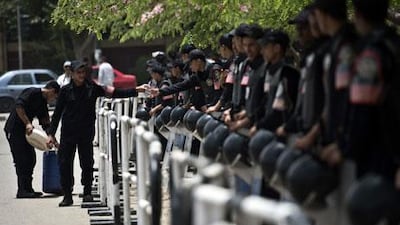CAIRO // Egypt's highest court ruled yesterday that the upper house of parliament and a panel that drafted the constitution were elected improperly last year.
The decision is likely to weaken the legitimacy of the president, Mohammed Morsi, and prolong political turmoil that has permeated the country since Hosni Mubarak was removed from power in a revolt more than two years ago.
The ruling will not have any immediate bearing on the legislature because the Supreme Constitutional Court said the Shura Council should continue its work until after elections for the lower house take place this year or early next year.
However, it adds to the already tense political atmosphere in Egypt, where a battle between judges and the president has been simmering for months.
The judgment also provides ammunition for the president's political opponents, who were firmly against the Islamist-dominated committee that rewrote the constitution. They have accused Mr Morsi of paving the way for the Muslim Brotherhood - of which he was a senior official - to dominate the government and legislature through its Freedom and Justice Party, along with other Islamist groups.
"This proves that the transitional period of Egypt can be characterised as one step forward, two steps backward," said Mazen Hassan, a professor of political science at Cairo University.
"We have been running around in vicious circles for the past two years and there is no sign that we are going to make progress any time soon."
Nathan Brown, a professor at Georgetown University in Washington who has studied Egypt's legal developments, said the ruling "will be regarded as a moral victory by the opposition and a legal victory by the government."
"The effect may be to reinforce an already unfortunate tendency on both sides: when they find themselves deeply entrenched, they both keep digging," he said.
The court's ruling yesterday was not a surprise because it issued a similar ruling on the lower house of parliament last summer, just before Mr Morsi was elected president in June, leading to its immediate dissolution.
In that judgment and yesterday's, the court said elections were unconstitutional because political parties fielded candidates for a portion of seats reserved for independents. What did raise eyebrows was the timing.
"The rulings were almost the exact same, so it raises the question of why did the court take this long," Mr Hassan said.
The dissolution of the lower house last year temporarily gave Mr Morsi full legislative powers, but in a bid to calm anger that he was ruling with nearly unchecked powers he transferred those powers to the Shura Council in January. It has been the only lawmaking body since, but it has drawn criticism for being unrepresentative of Egypt.
Only 180 of its 270 members were elected, with the other 90 appointed by the president. Only 5 per cent of its members are Christians - about half the proportion of the population. And about 80 per cent of the seats are controlled by the Freedom and Justice Party and the ultraconservative Al Nour party.
Elections for the Shura Council had the lowest turnout of voters among polls held last year, of about 7 per cent. This was largely because it was considered under the old constitution to be a relatively weak institution. The ensuing rulings from the Supreme Constitutional Court, however, left it as the most powerful.
The court's ruling yesterday that the Shura Council should continue until new elections was seen by the president's supporters as a partial victory.
Essam El Erian, a senior Freedom and Justice Party official, said the ruling only meant a possible reduction of the Shura Council's four-year term "or a presidential decree could be issued to hold supplementary elections for one-third" of the seats.
Mr Morsi expressed no opinion on the ruling yesterday. His office said: "The president is the judge between authorities, and practises his constitutional and legal role so as to ensure authorities perform their full roles in accordance with the constitution."

